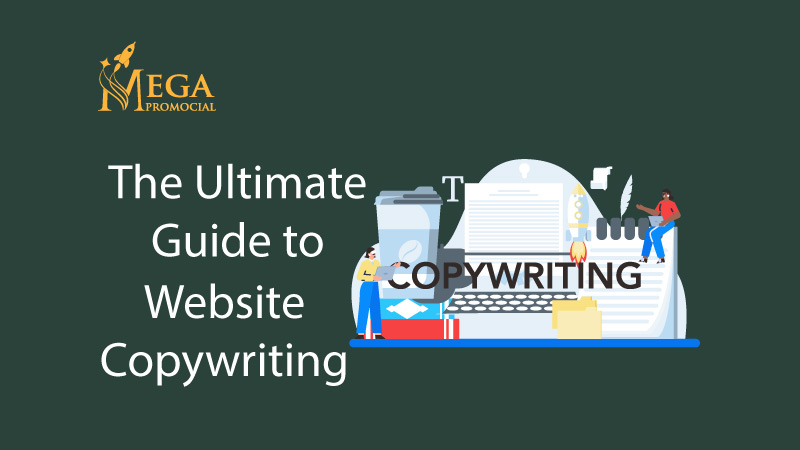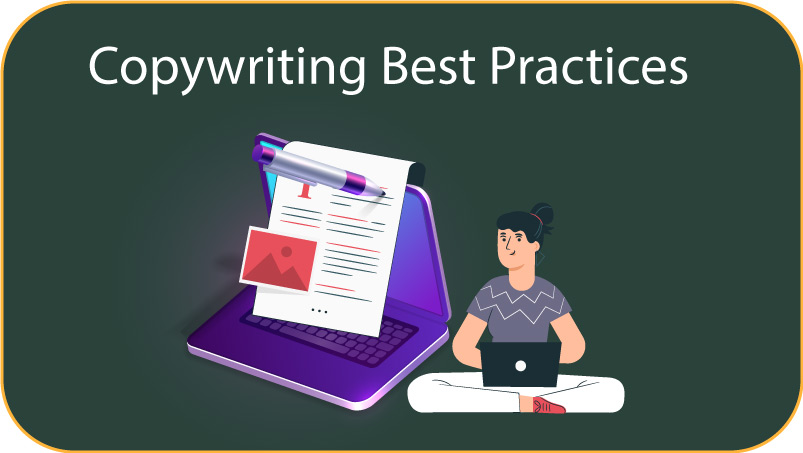Navigating the Future: Key Industry Trends Shaping Digital Marketing
In the fast-paced world of digital marketing, staying ahead of the curve is essential for businesses and marketer

Meta Description: Get to know copywriting for websites, best practices for effective copywriting and discover professional copywriting tools.

Communicating through your website content is one of the most important aspects for any business. With your website words, you share the value of your offerings to potential customers. In this guide, we’ll go through everything needed to know about effective website communication: from persuasive communication to techniques and best methods to create useful website content.
Website communication is using words strategically on website pages, like home pages and product pages. It captures attention and encourages desired actions through compelling and clear content.
💡 Key Takeaway: To increase conversion rates, focus on creating clear and compelling calls-to-action, highlighting your unique selling proposition, providing social proof, using persuasive copywriting techniques, optimizing for readability and scannability, and leveraging the power of visuals. Implementing these strategies in your website copy can significantly improve your conversion rates and drive more desirable actions from your visitors.
When writing for your website, focus on engaging your readers in different ways. Consider their interests and needs, then craft your message around solutions.
💡 key Takeaway:The key is being brief and straightforward in website text. Cut extra words, use short sentences, and organize information simply so everyone can easily understand.
When writing for a website, following tried and true methods can significantly boost how well your content works. Here are some key strategies to keep in handy:
While tools like Grammarly, Hemingway Editor, and CoSchedule Headline Analyzer can refine your writing, focus first on understanding readers and crafting messages that resonate. Write simply and directly to inform without jargon or clichés. Captivating headlines draw readers in, but compelling content keeps them engaged. Use an informal yet knowledgeable tone to discuss key points succinctly.
Consider too how search engines view your words. Research keywords important to your readers and include them naturally. Write conversationally to welcome investigation without demands. Persuade through empathy, honesty and benefit rather than directives alone.
💡 Key Takeaway: Know your audience well. Craft relatable yet truthful messages simply. Headlines attract; substance satisfies. tools refine, but connection inspires action.

When sharing information, use verbs that spark curiosity without orders. Suggest avenues for learning that respect each person’s path. Phrases like “explore new possibilities” or “consider ways to…” welcome exploration without demands. Leave space for individual growth and goals.
Some examples of invitations over instructions:
Using exciting words in your website text can inspire people to interact with your site. Carefully choose these words and don’t overdo it. Make sure the words match the overall tone and goal of the content.
💡 Key Takeaway: Exciting language in your website text can motivate people to take the desired action.
Hard to understand phrases and terms can hurt how people see you. Try to make your message easy to grasp with straightforward writing. Don’t use complicated language people don’t get. Here are some tips to help make your website text easy to grasp:
💡 key Takewway: To ensure your website words stay engaging and relatable, steer clear of overused phrases and words few understand. Instead, focus on clear, specific language that shows the unique help your product or service offers. Being real and clear will help build trust with your audience and lead to better talking.
Titles are significant when it comes to writing for a website. They’re the first thing people see and they can sway someone into reading or ignoring your content. An enticing title both captures attention and tempts the reader to read more. Here are some ideas for attention-grabbing headlines:
– “7 Proven Techniques to Enhance Copywriting Results”
– “Top 10 Tips for Engaging Website Text”
– “Are You Struggling with Copywriting Errors on Your Website?”
– “Interested in Boosting Your Site Engagement? Apply These Title Formulas”
– “Learn How Improved Copywriting Raises Your Brand Visibility”
– “Grow Your Conversion Rate with Influential Website Text”
– “Guaranteed Outcomes: Improve Your Text Writing with these Tested Approaches”
– “Unlock Your Website’s Potential with Interesting Text”
Quotes: “Your headline won’t work if it doesn’t tickle the reader’s curiosity, despite containing all the facts.” – Copyblogger
💡 Remember: Creating irresistible headlines is crucial in capturing and keeping your audience’s attention. Using numbers, asking questions, emphasizing benefits, and utilizing impactful words can make your titles stand out. Your headlines should genuinely depict your website’s content and should spark curiosity to promote more reading.
Writing good web content combines talent with the right tools. They aid in making your content engaging and convincing. Here are some necessary tools to boost your content writing and create standout website content:
Grammarly is like hiring a personal proofreader for your website. It’s a handy online tool to help you write better. You write, and Grammarly fixes it. It removes grammar blunders. It adds clarity. It boosts your content’s value. The secret? It’s all about algorithms and AI. These catch spelling mistakes, punctuation errors, and faulty grammar.
Plus, Grammarly will help with sentence form, word usage, and writing style. Your finished piece looks polished, professional, and enticing. And no need to worry about being accused of plagiarism, Grammarly’s got that covered too. It checks for originality.
Grammarly is a time-saver for website copywriting. It’s like a safety net for gaffes, it makes sure your point gets across, precisely. Put simply, it’s your go-to tool to make your webpage content shine, to keep your visitors coming back.
Grammarly offers remarkable features including:
💡 Quick Note: For website writers, Grammarly is very useful. It checks grammar, spelling, and clarity. It also can boost your vocabulary. This helps you write clean content that grabs attention and boosts credibility.
The Hemingway Editor is a strong tool for website writers. It shows you how clear and readable your writing is. This tool points out hard-to-read sentences, extra adverbs, and passive voice use. It helps writers cut down their writing and send their message clearly. It also gives a readability score showing the grade level needed to understand the writing.
This ensures your writing reaches a lot of people. Plus, the Hemingway Editor offers different wording ideas to make your writing even more engaging. If you write for websites, using the Hemingway Editor can make your writing better and more impactful. This boosts user engagement and conversions.
💡 Key Takeaway: The Hemingway Editor greatly helps website writers. It improves readability and clarity and makes your writing more engaging. It points out complex sentences, suggests new phrases, and ensures lots of people can read your writing.
Want your website’s visitors to sit up and take notice? The key is in your headline, and the CoSchedule Headline Analyzer can help. It scrutinizes your headlines, considering word mix, type, and size. It gives you a grade and suggests ways to make your headline more appealing. Plus, it points out the potent, emotional, and generics words your headline employs. Try the CoSchedule Headline Analyzer and create headlines that strike a chord with your audience and boost click rates.
💡 Quick Tip: The CoSchedule Headline Analyzer is a fantastic way to refine your website’s headlines for maximum effectiveness and engagement.
RephraseIn conclusion, captivating copywriting for landing pages is crucial for maximizing conversions. By creating attention-grabbing headlines, engaging body copy, and compelling CTAs, copywriters can create landing pages that captivate visitors and drive them to take the desired action. So, whether you’re promoting a product, capturing leads, or driving conversions, make sure your landing page copy is captivating and persuasive.
Solid website writing is key. It shares your brand, connects with visitors, and shapes their responses. Trust comes with quality writing. Clear messages and high conversion rates drive business growth.
To up your website writing game, have a clear message, persuasive wording, and spotlight perks. Content should suit your target group. Add stories, speak their language, and keep enhancing your writing based on feedback and data.
Aim for short, powerful writing. The balance is significant—be brief and informative. Split content into smaller parts, use engaging titles, and focus on top-quality to maintain visitor interest.
To make your website SEO-friendly, use relevant keywords naturally, flavorful meta tags, and create attractive, helpful content. Quality user experience, mobile-readiness, and routine content updates go well with both search engine rules and user desires.
Sharing tales makes your brand personable. Use stories that click with your followers, leading to an emotional bond. Stories not only make your brand unforgettable, but they also transmit your brand’s beliefs and character, distinguishing you in a buzzing online world.
Our blog is a hub for valuable resources, informative guides, and insightful commentary on a
variety of industry topics, designed to help you stay up-to-date and informed.
In the fast-paced world of digital marketing, staying ahead of the curve is essential for businesses and marketer
In the fast-paced and ever-evolving world of digital marketing, staying informed and continuously learning is cru
In the ever-evolving world of digital marketing, staying ahead of the curve and building a strong online presence